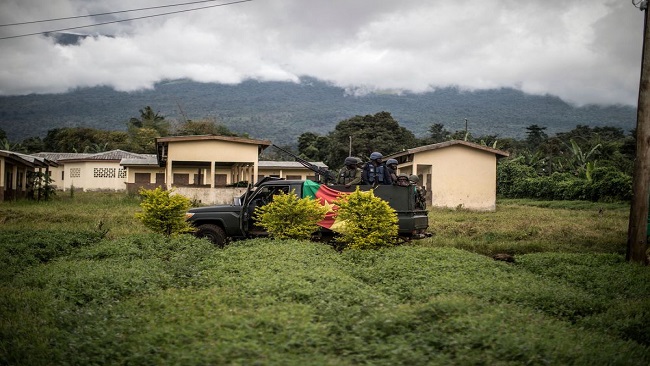Republic of Cameroon: French-English Divide Can Be Lethal in This African Nation
Cyprain fled his home when separatist fighters in Cameroon’s Northwest region threatened to kill him after he served government soldiers at his roadside bar.
Gruesome Images
While the government has blocked journalists from visiting the regions independently, gruesome images appear almost daily on social media. In a recent incident, a photo emerged of the head of a decapitated soldier that was left in the middle of a road in the Northwest’s regional capital, Bamenda, by suspected insurgents.
That’s isolated the area from the rest of oil-dependent Cameroon, which is a key regional hub, with roads and ports that are vital for landlocked neighbours including Chad and Central African Republic.
Agricultural Crisis
Cameroon’s top state-owned agribusiness said this week it has lost 35 billion CFA francs ($61 million) as a result of the crisis and more than half of its 22,000 employees are unable to work. The Cameroon Development Corp.’s three main crops — palm oil, rubber and bananas — have dropped significantly and large swathes of its farmland in the two Anglophone regions have been completely destroyed, General Manager Franklin Njie said.
The roots of the crisis date to the decision by the colonial powers to split the nation after World War I into a French-run zone and a smaller, British-controlled area. Since they were unified in 1961, the English-speaking minority, about a fifth of the population, has complained they don’t have equal job and educational opportunities as the French speaking majority.
Cameroon’s military has been accused of abuses including summary executions and raiding villages by advocacy groups such as Human Rights Watch and Amnesty International. Separatists have killed more than 160 police and military officials, according to the government, and have filmed themselves on mobile phones torturing village chiefs they accuse of collaborating with the authorities.
Army Abuses
The head of communication of the defense ministry, Didier Badjeck, rejected allegations from residents that the army was responsible for abuses and has dismissed reports that the military has set houses ablaze in the two restive regions as untrue.
“There is a lot of fake news on social media on this crisis,” he said by phone.
While Biya initially ignored the crisis, he has pledged to create a committee to disarm and reintegrate fighters. The decision triggered a spike in violence in the two regions, fueling clashes between separatists and defense forces.
“The government in Yaounde has taken a few measures but it hasn’t fundamentally addressed the root causes of the crisis and remains opposed to an inclusive dialog,” Heungoup said.
About 300 armed men swarmed into the town of Bangourain on Dec. 23 and set houses ablaze in what was the biggest attack in French-speaking territory since the conflict began.
The incident triggered such angry reactions on social media from Cameroonians that the Center for Human Rights and Democracy in Africa issued a statement urging Francophones and Anglophones to “exercise restraint and refrain from hate speech and retaliation against one another.”
Among the thousands of people who’ve recently fled to French-speaking areas is Killian, a 41-year-old carpenter who asked not to be identified by his surname for fear of reprisals. He said he escaped as the military burned down his home and dozens of others in the town of Kumbo in the Northwest.
“I barely escaped with my dear life,” he said. “I hope my wife and my two children are alive.”
Source: Bloomberg





